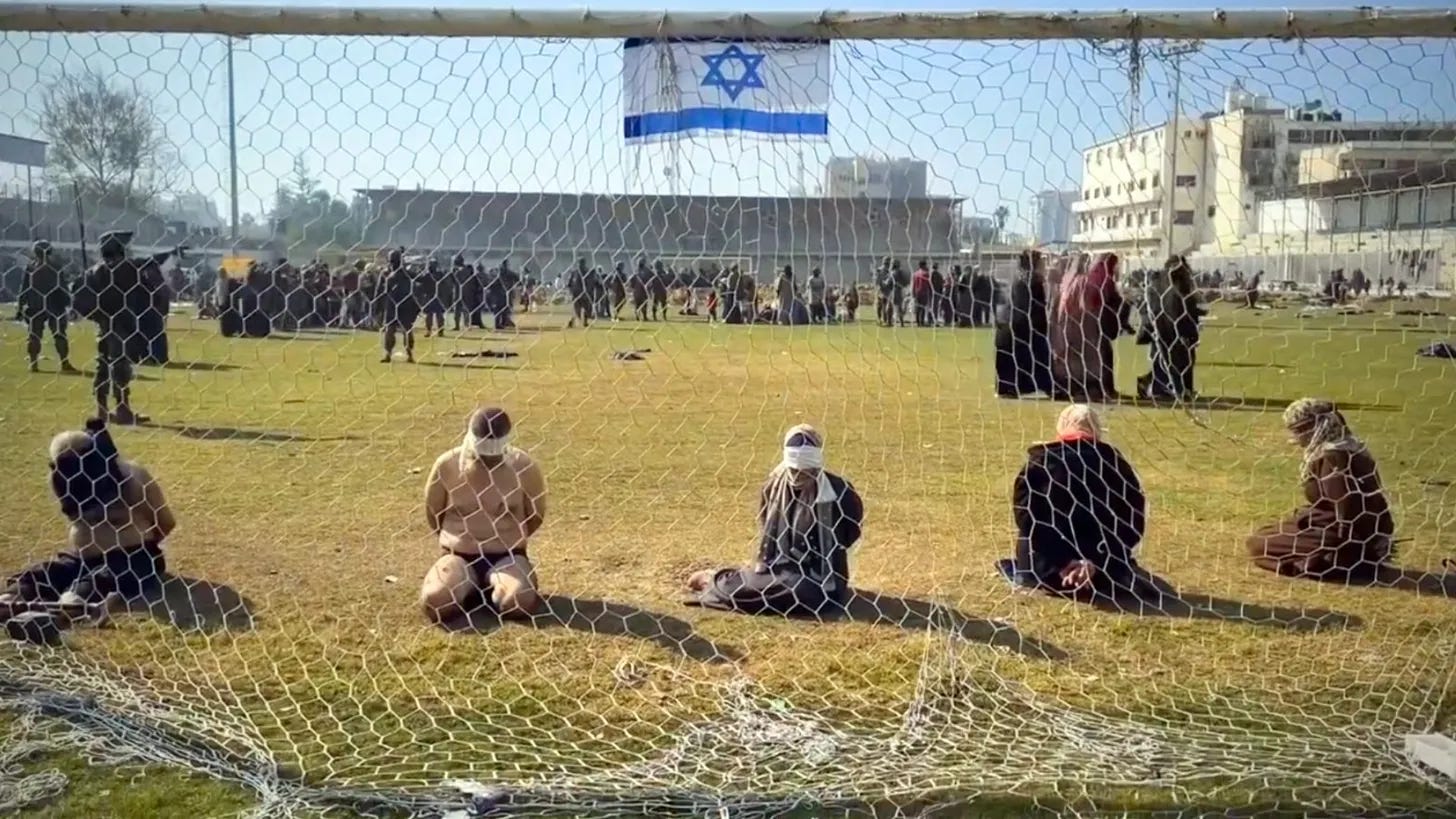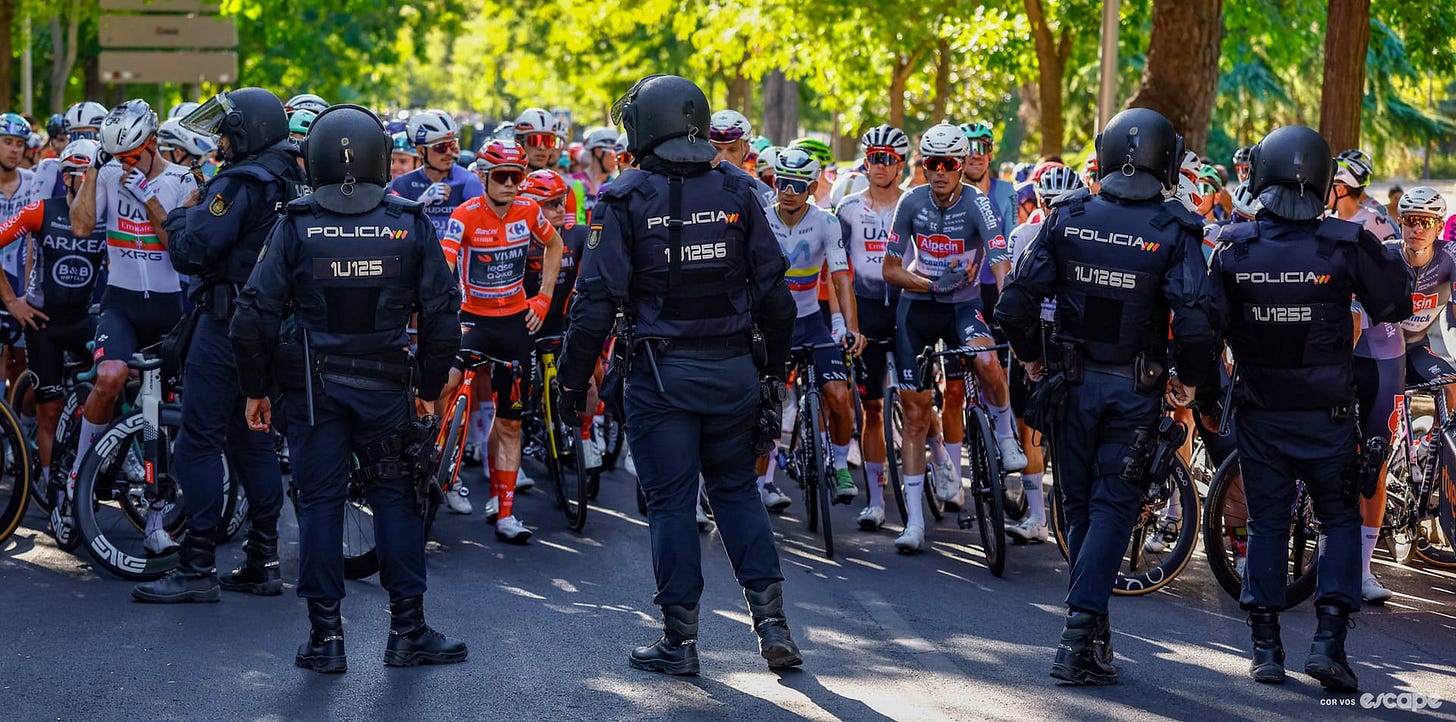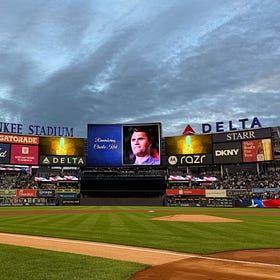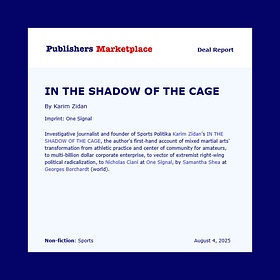The Road Paved in Blood
This week's roundup: UCI events run on roads paved in blood; Spain’s PM calls for Israel sports ban;Trans student abandons lawsuit over safety risks; Cricket diplomacy collapses between India-Pakistan
Welcome to Everything is Fine!—a bi-weekly round-up post that highlights some of the sport-politics stories that you may have missed amid the never-ending news cycle. This post is available to paid subscribers and is presented by Sports Politika, a media venture founded by investigative journalist and researcher Karim Zidan that strives to help you understand how sports and politics shape the world around us.
If you share this vision, please consider supporting us by joining our community and becoming a paid subscriber. We are currently running a special offer whereby you can secure a subscription at a 40% discounted price, forever.
On Sunday evening, in a car park across from their team hotel in suburban Madrid, Jonas Vingegaard, Joāo Almeida and Tom Pidcock—the top three finishers at the 2025 Vuelta a España—stepped on to a makeshift podium of drinks coolers, and sprayed each other with champagne.
It wasn’t quite the picturesque podium finish that any of them had expected after three weeks of chaotic racing fractured by widespread pro-Palestinian protests.
The Vuelta is an annual multi-stage road cycling race primarily held in Spain that is part of the Union Cycliste Internationale (UCI) World Tour. Along with the Tour de France and Giro d'Italia, the Vuelta is one of cycling's prestigious events. However, the 2025 edition was characterized by multiple pro-Palestine protests which caused crashes that forced two riders to quit the race, several changes to stage finishes and distances, and the abandonment of the final stage of the event.
These protests did not emerge from nowhere. Their focus was the presence of Israel-Premier Tech, a team funded by Canadian-Israeli philanthropist Sylvan Adams known as the "self-appointed Ambassador at large for the State of Israel." At a time when Israel’s ethnic cleansing of Gaza continues to dominate headlines, campaigners seized on the Vuelta’s visibility.
The protesters insisted that there is no clean separation between cycling’s landscapes and its political reality. This remains true for the UCI’s upcoming Road World Championships, which is being held in the Rwandan capital of Kigali for the first time.
Billed as a historic moment for African cycling, the event marked a major step in the sport’s globalization, offering a new generation of African riders an opportunity to showcase their talent. However, the event will also mark a crowning moment for Rwanda’s longtime autocrat Paul Kagame, who has effectively used sports to legitimize his rule and portray himself as a pioneering figure in Africa.
Serving as the de facto ruler of Rwanda since 1994, Kagame drew international praise for commanding the rebel force that ended the Rwandan genocide in 1994. However, he has since ruled his country with an iron fist, committing severe and systematic human rights abuses both within Rwanda and beyond its borders. This includes forced disappearances, assassinations of political opponents, torture and state-imposed censorship.
Kagame’s regime also helped fuel two wars in the neighbouring Democratic Republic of Congo as part of a struggle to control the country’s mines with valuable mineral resources, leading to the deaths of more than five million people. Thousands of Kagame’s soldiers and allied M23 militia continue to operate in eastern DRC, displacing hundreds of thousands of people, plundering mines rich in strategic mineral resources and leaving a trail of massacres, rapes and other gross human rights abuses.
In February 2025, the UCI announced that it was “monitoring” the situation in Rwanda as tensions with the DRC grew. However, the organization also ruled out the possibility of moving the event to Europe. The two countries eventually signed a peace treaty in June 2025, demanding the "disengagement, disarmament and conditional integration" of armed groups fighting in eastern DR Congo.
In an effort to soften his image and enhance his country’s international reputation, Kagame established partnerships with some of his favourite sports. From NBA appearances and sponsoring football clubs like Arsenal and Bayern Munich, to hosting international spectacles, the dictator is now firmly among a cadre of authoritarian leaders who exploit sports to whitewash their reputations on the global stage and advance their political agendas.
The 2025 UCI Road World Championships is among the most important sports events that Kagame has secured. In anticipation, his government announced public school closures for the week of the race, while public and private institutions have been advised to work remotely when possible. Special fan zones are being set up across the capital, offering the public a chance to “embrace the 2025 UCI Road World Championships together.”
And yet, as Kagame continues to court global prestige, his regime continues to vie for regional dominance under the cover of peacekeeping and post-genocide legitimacy. From its incursions into eastern Congo, where it is backing the M23 paramilitary rebel group and is also suspected of mineral smuggling, to its military deployments in northern Mozambique’s Cabo Delgado, Kagame is trying to cement his place as Africa’s most influential dictator.
The UCI World Championships may light the way for Africa’s next cycling generation, but the path towards the finish line winds across roads paved in blood.

In the News
Spain’s PM calls for Israel sports ban
Spain’s prime minister Pedro Sánchez has called for Israel to be barred from international sports.
Speaking a day after pro-Palestinian demonstrators forced a premature end to the Vuelta a España race, Sánchez said he had “a deep admiration” for all those who had protested peacefully against the participation of the Israel-Premier Tech team.
“It’s already happening in some parts of the world and we’ve seen how European governments are saying that as long as the barbarism continues, Israel can’t use any international platform to whitewash its presence,” Sánchez said on Monday. “And I think that sports organizations need to ask themselves whether it’s ethical for Israel to keep taking part in international competitions.”
‘Cricket diplomacy’ collapses between India and Pakistan
Last Sunday, the Indian and Pakistani cricket teams faced off in the Asia Cup in their first meeting since Delhi accused Islamabad of masterminding a terrorist attack in the disputed Indian region of Kashmir in April, which killed 26 people. Pakistan denied any involvement.
After the match, which India won in decisive fashion, the Indian team refused to shake hands with their counterparts—an act that underscores the deteriorating relations between the nations and the erosion of their once celebrated cricket diplomacy.
Meanwhile, the two teams are set to meet for the second time in the span of a week when they face off in the Asia Cup 2025 Super Four, a round-robin in which the top two finishers will progress to the Asia Cup 2025 final on Sunday, September 28.
Trans student abandons lawsuit over safety risks
Lindsay Hecox, a 24-year-old transgender woman and university student who challenged Idaho's ban on transgender athletes in women's sports has asked the U.S. Supreme Court to dismiss her case, citing personal safety concerns and a desire to focus on graduating from college.
"I am afraid that if I continue my lawsuit, I will personally be subjected to harassment that will negatively impact my mental health, my safety, and my ability to graduate as soon as possible," Hecox stated.
Hecox has stopped participating in women's club soccer at her university and pledged not to file another lawsuit challenging the law.
Mamdani takes on FIFA greed
Zohran Mamdani, who is currently leading the race to become mayor of New York City, has launched a “Game Over Greed” petition that calls on FIFA to abandon its plan to use dynamic pricing for the 2026 World Cup.
“This year, for the first time, FIFA is using dynamic pricing for ticket sales,” read the petition. “They can raise prices, in real time, depending on how much profit they think they can make off of us. Those tickets can then be resold on an official FIFA platform with NO price cap—yet another method of gatekeeping the game. And to make matters worse, unlike for the past three World Cups, there are no seats set aside for residents.”
Apart from putting an end to dynamic pricing and setting a cap on resale princes, the petition also calls for 15% of tickets to be set aside for local residents at a marked discount.
Morocco to use stadiums as judicial courts during 2030 World Cup
Morocco, which will co-host the 2030 World Cup alongside Spain and Portugal, is planning to set up judicial committees in stadiums to swiftly handle potential offences by fans during the tournament.
The North African nation is also expected to sign a judicial cooperation agreement with Spain and Portugal to speed up any potential extraditions or case transfers. It is also revising family and penal codes and introducing alternative penalties - such as electronic monitoring bracelets- to reduce prison overcrowding.
What I’m Reading
House Arab [Bidoun]
I would then spend the rest of the afternoon sitting in an armchair by the windows, watching the sunlight arpeggiate the water in the 9/11 Memorial fountains. The magazine was full of loveable weirdos who knew inordinate amounts about cuneiform or animal husbandry and were prone to causing collisions in the hallway because their faces were buried in paper proofs. Many of my colleagues reeked of money: hyphenated names, signet rings, private schools, Prada frames. My family had money, too, though I don’t think I got the job because of my pedigree, but because I spoke Arabic and English without an obvious accent.
The monks’ revolution: St. Catherine’s battle for independence [Mada Masr]
On the evening of August 26, at the foot of Jabal Moussa in the heart of South Sinai, St. Catherine’s Monastery descended into turmoil. From inside its walls, Archbishop Damianos, head of the monastery and Archbishop of Sinai, watched from a distance as hired guards stormed the monks’ cells, smashing doors and windows. “Come on, drag him out! Get out!” A monk’s voice could be heard yelling: “What? What’s going on?” Moments later, 11 barefoot monks in their nightclothes were dragged and thrown outside the gates of the monastery they had served for decades.
After surviving centuries of wars and occupations, St. Catherine’s Monastery now faces one of its most complex crises: an internal struggle over monastic authority entangled with external contest as Athens and Cairo vie for control over a site that for centuries embodied spiritual freedom — now at risk of becoming either a political bargaining chip or a lifeless heritage attraction folded into a wider development plan for the region.
Following the Sounds of Arabic to Rediscover Paris [The New York Times]
Paris is often associated with a single language: the romantic melody of French that echoes through its cafes, bookstores and cobbled streets. But as a cosmopolitan capital city, it is home to many more — and one in particular has helped shape the way Parisians speak, think and connect.
Arabic is France’s second-most-spoken language, with roughly four million speakers. From cafe terraces to music, art and food, its influence is woven into the fabric of Parisian life.
The Last Days Of Social Media [Noema Mag]
This convergence of bots, scammers, brand-funnels and soft‑core marketing underpins what might be called the bot-girl economy, a parasocial marketplace fueled in a large part by economic precarity. At its core is a transactional logic: Attention is scarce, intimacy is monetizable and platforms generally won’t intervene so long as engagement stays high. As more women now turn to online sex work, lots of men are eager to pay them for their services. And as these workers try to cope with the precarity imposed by platform metrics and competition, some can spiral, forever downward, into a transactional attention-to-intimacy logic that eventually turns them into more bot than human. To hold attention, some creators increasingly opt to behave like algorithms themselves, automating replies, optimizing content for engagement, or mimicking affection at scale. The distinction between performance and intention must surely erode as real people perform as synthetic avatars and synthetic avatars mimic real women.
There is loneliness, desperation and predation everywhere.
ICYMI
Sports in Charlie Kirk’s America
When sports leagues celebrate a man who profited on hate and division, it doesn’t just undercut the myth of unity in sports—it exposes what sports have become in Charlie Kirk’s America.
I'm writing a book
I signed a deal with Simon & Schuster to publish my first book, tentatively titled In the Shadow of the Cage.
To understand Trump, look to the arena
From cage fights at the White House to crowd censorship at the US Open, Trump’s sports appearances are a contest of power, loyalty, and spectacle.
Sports Politika is a newsletter about the intersection of sports, power and politics. If you like what you see, upgrade to a paid subscription ( or gift a subscription if you already have your own). We would appreciate if you could also like the post and let us know what you think in the comment section below.






